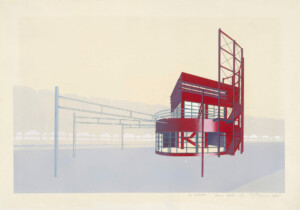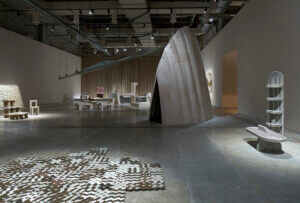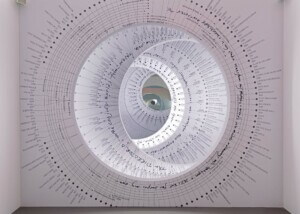Commentary continues to proliferate in the architecture community after Cooper Union’s last-minute decision to postpone the exhibition Vkhutemas: Laboratory of the Avant-Garde, which was supposed to open on January 25. The Soviet design school opened in Moscow in 1920 and operated for a decade before being shut down in 1930.
Architectural historian Jean-Louis Cohen, author of Building a New New World: Amerikanizm in Russian Architecture and coeditor of the forthcoming Detroit–Moscow–Detroit: An Architecture for Industrialization, 1917–1945, told AN that the postponement is “totally ridiculous.”
Over the weekend, a letter of support was circulated to demonstrate support for the show and its contents. As of this afternoon, the letter has nearly 700 signatures and has generated coverage in arts news. Among the signers are notable figures like Deborah Berke, Yve-Alain Bois, Cohen, Hal Foster, Steven Holl, Alfredo Jaar, Flavin Judd, Rem Koolhaas, Rosalind Krauss, Lev Manovich, Reinhold Martin, Kiel Moe, Eyal Weizman, Ines Weizman, Sarah Whiting, and Mark Wigley, among others. A number of AN contributors also signed the letter.
Addressed to Laura Sparks, president of Cooper Union, and Hayley Eber, acting dean of the school’s Irwin S. Chanin School of Architecture, the letter was created to express “deep concern and disappointment about the Cooper Union’s last-minute decision to postpone indefinitely the opening of the exhibition.”
The text affirms: “We stand in full solidarity with the people of Ukraine and all those who oppose Russia’s unjustified and brutal invasion. To conflate the work of an architectural school based in Moscow a century ago (and shut down after just one decade in a wave of cultural and political suppression) with the actions of the Russian regime today, however, represents both a profound misunderstanding of the history of Vkhutemas and a troubling instance of censorship and historical erasure.”
It adds that, like Cooper Union, “Vkhutemas was also a multi-ethnic and multinational space, with its members and affiliates coming from all over the Soviet Union, and beyond. Among its many Ukrainian-born faculty and students were Natan Altman, Iosif Chaikov, Olga Deineko, Daniil Fridman, Kazimir Malevich, Anatol Petrytsky, Isaak Rabinovich, David Shterenberg, Aleksandr Shevchenko, Nikolai Sokolov, and Lydia Zholtkevich, to name just a few.”
The statements’ signees “understand that this exhibition was postponed last year due to Russia’s invasion of Ukraine, and we respect the decision to do so, taken in consultation with the exhibition’s curators.” But for Cooper Union to abandon its work on Soviet and Russian architecture “would constitute a chilling impingement on academic freedom and education.” The text concludes by urging the school to “immediately engage in an open and responsible process, including conversations with the community as well as experts in the field, and to establish a timely date for the launch of Vkhutemas: Laboratory of the Avant-Garde, 1920-1930. This exhibition, which showcases work by former and current Cooper Union students, is an important reminder of the cultural experiments of the interwar years and their lasting legacies that stand in opposition to authoritarianism—both then and now.”
This statement responds in part to Peder Anker’s op-ed published in Archinect, which was significantly edited from its initial version but remains published on the platform’s website. Anker did not respond to AN’s request for comment.
Anker’s is perhaps the most prominent critique of the show, but others were also offended, including members of the Ukrainian community in New York’s Ukrainian Village and East Village neighborhoods. When Cooper Union announced the opening on its Facebook page on January 18, three days prior to the publication of Anker’s op-ed, pushback followed: “Shame on you for ignoring the plight of millions of Ukrainian people by celebrating the architecture of a terrorist state!” one commenter wrote. Another asked, “Are you not aware of current events or is there a Russian Assett [sic] on your staff?!”
When asked for clarification as to what discussions led to the postponement, Eber shared that “The Cooper Union fielded concerns and queries regarding the exhibition in conjunction with its initial announcement. [Anker’s] opinion piece intensified dialogue at Cooper, within our community, and the field at large.” She added: “Moving forward with the exhibition as planned at that time—without consideration of the diverse perspectives and increasingly sensitized environment through which the work would be considered—would have done a disservice to all involved.”
Eber shared a general update about the situation with AN, which read in part:
To be clear: the decision to provisionally postpone the exhibition was not made because of one person’s opinion and was not made lightly; we felt it was critical to have time and space to consider a way forward that both respects the study of this important period of architecture and is mindful of the environment in which the work is presented. To that end and as a next step, Cooper Union leadership is continuing to have instructive discussions with our students and faculty, as well as with members of Cooper’s Ukrainian community.
While it is appropriate to be in dialogue about the ongoing war in Ukraine, the complex situation has, in this instance, been flattened into a binary division. Cohen said the operation to delay the show has the “perfume of the Cold War in this primitive, anti-Russia feeling.”
The anticipated exhibition will include student work from seminars led by Anna Bokov, an assistant professor adjunct at the school. She is the show’s co-curator, with Steven Hillyer, director of the Irwin S. Chanin School of Architecture Archive at The Cooper Union. (Bokov did not respond to AN’s request for comment.) As mentioned in his Archinect piece, Anker “knows the curator personally.” As recently as 2018, Bokov was publicly credited as a design director at Terreform ONE, where Anker has been an ongoing collaborator with the company’s founder Mitchell Joachim, most recently on a forthcoming article about commemorating COVID. (Mitchell Joachim did not respond to AN’s request for comment.) Currently Anker’s wife Nina is a design director at Terreform ONE. All four individuals collaborated on a 2019 text published by Actar in Design with Life: Biotech Architecture and Resilient Cities. Joachim, Nina Anker, and Bokov collaborated on projects at Terreform ONE, including a monarch sanctuary for Kenmare Square, though while Bokov is credited for the design on Joachim’s personal website, her name is absent from the project’s credits on Terreform ONE’s website. Cohen stated that Peder Anker’s letter has a “taste of vengeance” and seems “deeply personal.”
In correspondence with ARTnews, Peder Anker clarified that his interest remains in questioning “the timing of the show.” He also “said he had sought to show how the ‘intellectual patronage’ of Bokov’s father, the architect Andrey Bokov, had allowed her to access material related to Vkhutemas.” As previously reported by AN, the initial version of Anker’s text included an image of Andrey Bokov shaking hands with Vladimir Putin during an awards ceremony in 2017 as evidence of “soft power.” There was no further explanation to support the claim. Cohen said that “while Andrey Bokov is one of the most prominent officials in post-Soviet architecture, he still can’t be considered part of Putin’s power machine.” He offered that the question of archival access is not legitimate, as the archives are open to anyone who can speak Russian to review the documents. Anker, in his op-ed, wrote that Bokov’s “scholarly work behind the exhibit is solid.” Cohen said, “Saying Anna Bokov is linked to Putin is, to me, an absurdity.”
Bokov was scheduled to be in conversation with Cohen about the exhibition in early February. (An event last November related to Vkhutemas and typography led by Polina Godz with Anna Bokov took place as scheduled.) While a representative shared that “the format and plans for the Feb 7 program are also being reconsidered,” the event does not appear on the school’s events and exhibitions calendar, though the individual web page is still live.
The show is designed to be viewed in a second-floor gallery and along a hallway inside Cooper Union’s Foundation Building. The exhibition, which consists of student work and research carried out over multiple years, had been partially de-installed, as the items in the hallway had been removed. The gallery, at midweek, was locked and the windows were covered. Students had worked tirelessly ahead of the opening and, according to a source, were upset with the situation. While there is widespread empathy with the plight of Ukrainians and with Ukrainian neighbors, there was also disbelief about the show’s delay. (The student body includes both Ukrainian and Russian individuals.) The efforts, though modest in scale, were intended to showcase student work, and some students felt they didn’t have a voice in the current situation.
Cohen observed that Vkhutemas represents exactly the kind of cosmopolitan culture threatened by Russia’s contemporary aggressions, so attempting to stop the show lands as a bit paradoxical. A student expressed a similar sentiment to AN when sharing that their colleagues at Cooper Union care about the world they live in. They see Cooper Union as aiming to be different during a time of crisis. In a way, they ventured, Vkhutemas was doing the same thing.











